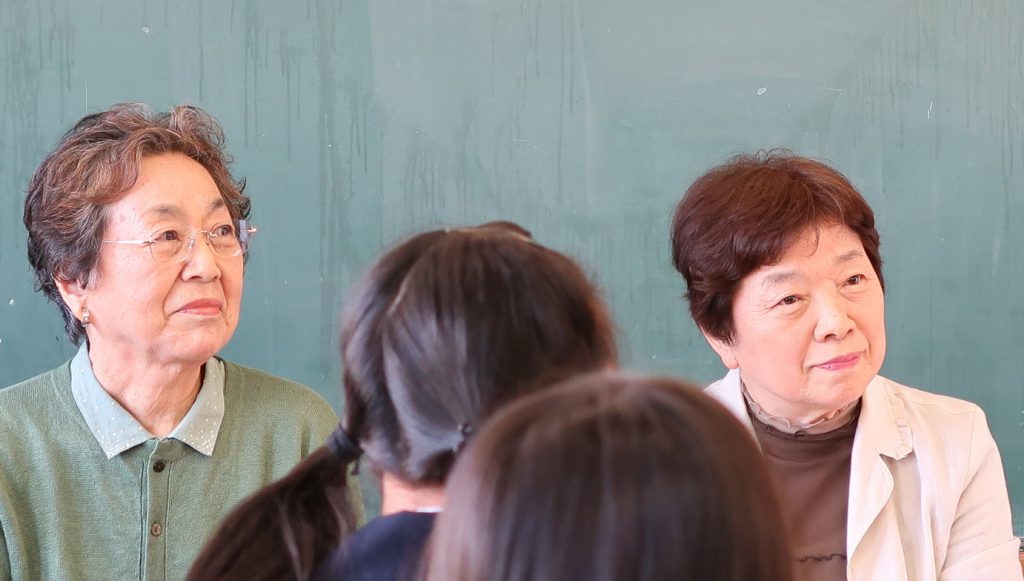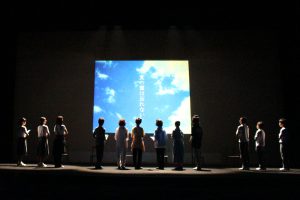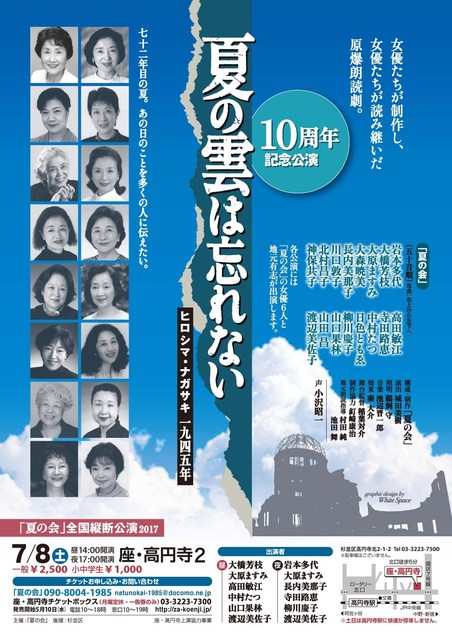This August marked the third year ANT-Hiroshima has helped organize free performances of the recitation play The Clouds in Summer Won’t Forget (Natsu no Kumo wa Wasurenai). This year, members of Natsu no Kai, the group of actresses who have been performing the play across Japan since 2008, gave three performances for students from Hiroshima’s public junior high schools. Around 2,300 students saw the play.
ANT-Hiroshima first became involved with The Clouds in Summer Won’t Forget after staff and volunteers were moved by a performance of the play. They had been searching for effective ways to convey and hand over the experiences of Hiroshima and Nagasaki to younger generations through art and thought The Clouds in Summer Won’t Forget was an excellent way to do so. ANT-Hiroshima coordinates with Natsu no Kai, local educators, and venues to hold the free performances. More and more schools and students have participated since ANT-Hiroshima began the project three years ago; in past years elementary school students have also attended.

Takako Morii and Ikuko Takemura, both hibakusha, spearheaded the project in order to give a greater number local students the opportunity to learn about the atomic bombings of Hiroshima and Nagasaki. Morii-san and Takemura-san lead fundraisers to support the project, and the money goes directly toward implementing performances. Many donors are hibakusha themselves. Along with fundraising, Morii-san and Takemura-san visit audience members’ schools to further deepen the play’s impact as peace education. They discuss the events described in the script and provide more context through sharing their own experiences.
The Clouds in Summer Won’t Forget‘s script comprises of testimonies and poems written by hibakusha from Hiroshima and Nagasaki, as well as American photographer Joe O’Donnell. Perhaps the most well-known work included in the script is Sadako Kurihara’s poem “Let us be Midwives!” Along with testimonies written from an adult’s perspective, there are also shorter ones from children, which are read by five or six local junior high school students who join the production. The play ends with “Words of Farewell”: The performers trade off saying victims’ last words, which are as simple and poignant as a call for mother or asking a soldier “Why has this happened?”

Although one might expect a recitation play to feel less polished than a memorized performance, the staging of The Clouds in Summer Won’t Forget was impressive and professional. Six chairs were the only setting, and the actresses deftly moved them between scenes to change the atmosphere. The lighting was dynamic, using changing color or a shifting spotlight to convey more movement than the actresses themselves, who were always still while speaking. At the beginning of each scene, the title and author of each testimony or poem was projected on a screen at the rear of the stage.
The six actresses, all of a venerable age and with storied careers, gave subtle and contentious performances. During a question and answer session between the actresses and around 15 students following one of the performances, a student asked how the actresses put their own emotion into their recitation. One actress replied, “We do not try to express our own emotions. Rather, we imagine the feelings of the writer and try to convey their voice. That’s why we don’t raise our faces when we read from the script.” The recitation play’s medium is an integral part of its message.
Although they prioritize the voices in the script and are not themselves from Hiroshima or Nagasaki, the actresses said they all have experienced war. Their approach to performing does not emphasize their own emotion, but their motivation for performing is grounded in personal experience.

The question and answer session began with all the students sharing a short reflection about the play. Many students’ comments included a confirmed belief that war is wrong, that they could better imagine what the atomic bombings were like, and that they also wanted to do something to tell this story. The actresses said this last comment is what they are happiest to hear from people who watch The Clouds in Summer Won’t Forget.
In his reflection, one of the students connected the play with his worry about North Korea, which had launched a missile over Hokkaido only the day before. An actress responded that Japan was once a military nation not so different from today’s North Korea. From comments and experiences like this, hopefully the students can gain a nuanced historical perspective, improve their critical thinking, and develop a similarly nuanced and open-minded view of the present. An actress said, “From now on, you have to decide for yourself what’s true.”

